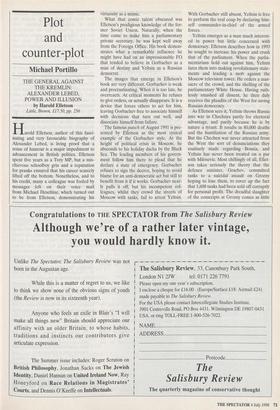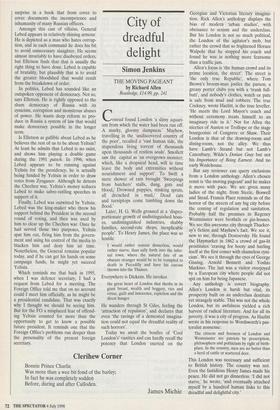Plot and counter-plot
Michael Portillo
THE GENERAL AGAINST THE KREMLIN: ALEXANDER LEBED, POWER AND ILLUSION by Harold Elletson Little, Brown, f1Z50, pp. 256
Harold Elletson, author of this fasci- nating and very favourable biography of Alexander Lebed, is living proof that a sense of humour is a major impediment to advancement in British politics. Elletson spent five years as a Tory MP, but a mis- chievous schoolboy grin and a reputation for pranks ensured that his career scarcely lifted off the bottom. Nonetheless, and to his credit, many a colleague was fooled by messages left on their voice mail from Michael Heseltine, which turned out to be from Elletson, demonstrating his virtuosity as a mimic.
What that comic talent obscured was Elletson's prodigious knowledge of the for- mer Soviet Union. Naturally, when the time came to make him a parliamentary private secretary, he was kept well away from the Foreign Office. His book demon- strates what a remarkable influence he might have had on an impressionable FO that tended to believe in Gorbachev as a man of destiny and Yeltsin as a Russian democrat.
The images that emerge in Elletson's book are very different. Gorbachev is weak and procrastinating. When it is too late, he overreacts. At critical moments he refuses to give orders, or actually disappears. It is a device that forces others to act for him, leaving Gorbachev free to associate himself with decisions that turn out well, and dissociate himself from failure.
The famous putsch of August 1991 is pre- sented by Elletson as the most cynical example of the Gorbachev style. At the height of political crisis in Moscow, he absconds to his holiday dacha by the Black Sea. The leading members of his govern- ment follow him there to plead that he declare a state of emergency. Gorbachev refuses to sign the decree, hoping to avoid blame for an anti-democratic act but still to benefit from it if it works. Gorbachev near- ly pulls it off, but his incompetent col- leagues, whilst they crowd the streets of Moscow with tanks, fail to arrest Yeltsin. With Gorbachev still absent, Yeltsin is free to perform the real coup by declaring him- self commander-in-chief of the armed forces.
Yeltsin emerges as a man much interest- ed in power but little concerned with democracy. Elletson describes how in 1993 he sought to increase his power and crush that of the parliament. When the parlia- mentarians hold out against him, Yeltsin lures them into making revolutionary state- ments and leading a mob against the Moscow television tower. He orders a mas- sacre of the crowd, and the shelling of the parliamentary White House. Having ruth- lessly smashed all dissent, he then duly receives the plaudits of the West for saving Russian democracy.
As Elletson sees it, Yeltsin throws Russia into war in Chechnya partly for electoral advantage, and partly because he is by nature a tyrant. It results in 80,000 deaths and the humiliation of the Russian army. But the Chechen war never attracted from the West the sort of denunciations they routinely made regarding Bosnia, and Yeltsin has never been treated on a par with Milosevic. Most chillingly of all, Ellet- son takes seriously the theory that the defence minister, Grachev, committed tanks to a suicidal assault on Grozny hoping to lose them, to cover up the fact that 1,600 tanks had been sold off corruptly for personal profit. The dreadful slaughter of the conscripts at Grozny comes as little surprise in a book that from cover to cover documents the incompetence and inhumanity of many Russian officers.
Amongst this cast of villains, General Lebed appears in relatively shining armour. He is depicted as a man who hates corrup- tion, and in each command he does his bit to avoid unnecessary slaughter. He seems almost invariably to have disobeyed orders, but Elletson finds that that is usually the right thing to have done. Lebed is capable of brutality, but plausibly that is to avoid the greater bloodshed that would result from the breakdown of order.
In politics, Lebed has sounded like an outspoken opponent of democracy. Not so, says Elletson. He is rightly opposed to the sham democracy of Russia with its cynicism, corruption and monstrous abuses of power. He wants deep reform to pro- duce in Russia a system of law that would make democracy possible in the longer term.
Is Elletson as gullible about Lebed as he believes the rest of us to be about Yeltsin? At least he admits that Lebed is no saint, and shows him playing a double game during the 1991 putsch. In 1996, when Lebed appears to be running against Yeltsin for the presidency, he is actually being funded by Yeltsin in order to draw votes from Zyuganov. Although he detests the Chechen war, Yeltsin's money seduces Lebed to make sabre-rattling speeches in support of it.
Finally, Lebed was outwitted by Yeltsin. Lebed was the king-maker who threw his support behind the President in the second round of voting, and then was used by him to clear up the Chechen war. Once he had served those two purposes, Yeltsin spat him out, firing him from the govern- ment and using his control of the media to blacken him and deny him air time. Nonetheless, the General remains popular today, and if he can get his hands on some campaign funds, he might yet succeed Yeltsin.
Which reminds me that back in 1995, when I was defence secretary, I had a request from Lebed for a meeting. The Foreign Office told me that on no account could I meet him officially, as he might be a presidential candidate. That was exactly why I thought we should be seeing him. But for the FO a misplaced fear of offend- ing Yeltsin counted for more than the opportunity to get to know a possible future president. It reminds one that the Foreign Office's problems run deeper than the personality of the present foreign secretary.















































































































 Previous page
Previous page